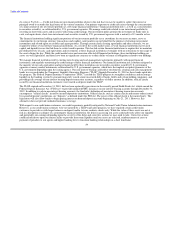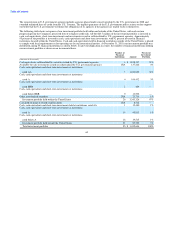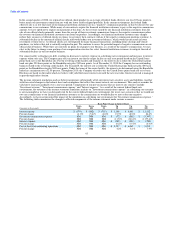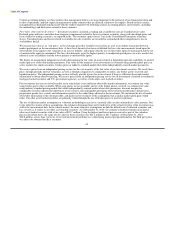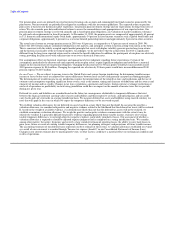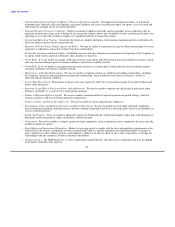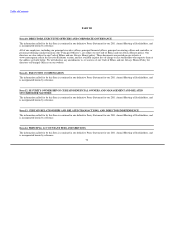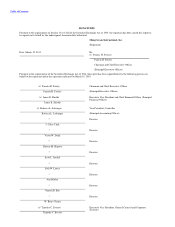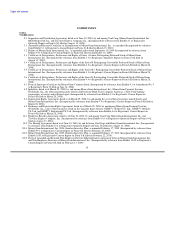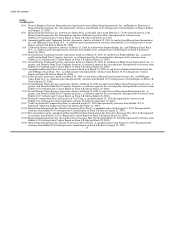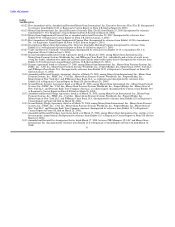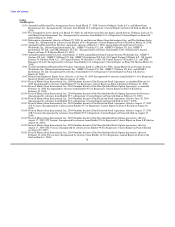MoneyGram 2010 Annual Report Download - page 72
Download and view the complete annual report
Please find page 72 of the 2010 MoneyGram annual report below. You can navigate through the pages in the report by either clicking on the pages listed below, or by using the keyword search tool below to find specific information within the annual report.
Table of Contents
• Sustained Disruptions in Financial Market or Financial Institution Liquidity. Disruption in the financial markets or at financial
institutions may adversely affect our liquidity, our agents' liquidity, our access to credit and capital, our agents' access to credit and
capital and our earnings on our investment portfolio.
• Sustained Negative Economic Conditions. Negative economic conditions generally and in geographic areas or industries that are
important to our business may cause a decline in our transaction volume, and we may be unable to timely and effectively reduce our
operating costs or take other actions in response to a significant decline in transaction volume.
• International Migration Patterns. A material slow down or complete disruption of international migration patterns could adversely
affect our money transfer volume and growth rate.
• Retention of Global Funds Transfer Agents and Billers. We may be unable to maintain retail agent or biller relationships or we may
experience a reduction in transaction volume from these relationships.
• Stockholder Litigation and Related Risks. Stockholder lawsuits and other litigation or government investigations of the Company or
its agents could result in material settlements, fines, penalties or legal fees.
• Credit Risks. If we are unable to manage credit risks from our retail agents and official check financial institution customers, which
risks may increase during negative economic conditions, our business could be harmed.
• Fraud Risks. If we are unable to manage fraud risks from consumers or certain agents, which risks may increase during negative
economic conditions, our business could be harmed.
• Maintenance of Banking Relationships. We may be unable to maintain existing or establish new banking relationships, including
the Company's domestic and international clearing bank relationships, which could adversely affect our business, results of
operation and our financial condition.
• Interest Rate Fluctuations. Fluctuations in interest rates may negatively affect the net investment margin of our official check and
money order businesses.
• Repricing of our Official Check and Money Order Businesses. We may be unable to operate our official check and money order
businesses profitably as a result of our revised pricing strategies.
• Failure to Maintain Sufficient Capital. We may be unable to maintain sufficient capital to pursue our growth strategy, fund key
strategic initiatives, and meet evolving regulatory requirements.
• Failure to Attract and Retain Key Employees. We may be unable to attract and retain key employees.
• Development of New and Enhanced Products and Related Investment. We may be unable to successfully and timely implement
new or enhanced technology and infrastructure, delivery methods and product and service offerings and to invest in new products or
services and infrastructure.
• Intellectual Property. If we are unable to adequately protect our brand and other intellectual property rights and avoid infringing on
third-party intellectual property rights, our business could be harmed.
• Competition. We may be unable to compete against our large competitors, niche competitors or new competitors that may enter the
markets in which we operate.
• United States and International Regulation. Failure by us or our agents to comply with the laws and regulatory requirements in the
United States and abroad, including the recently enacted Dodd-Frank Act and the regulations developed thereunder or changes in
laws, regulations or other industry practices and standards, could have an adverse effect on our results of operations, or change our
relationships with our customers, investors and other stakeholders.
• Changes in Laws. The Dodd-Frank Act, as well as regulations required thereby, and other laws or regulations that may be adopted
in the future, could adversely affect us.
69


